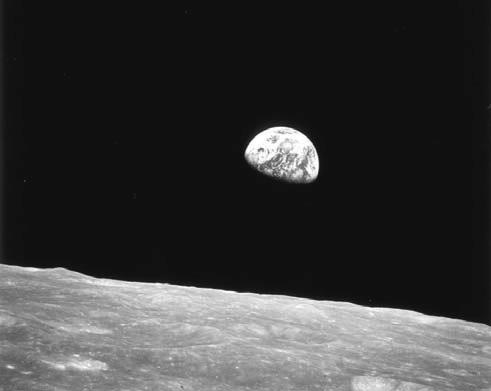ISUU Version



40-part version (eight SATBB choirs)






40-part version (eight SATBB choirs)


40-part version (eight SATBB choirs)
Fu ll Score
LEIPZIG LONDON NEW YOR K

Image courtesy of NASA
People are always asking what we discovered when we went to the Moon. What we discovered was the Earth.
(Dick Gordon, Apollo 12)
Once a photograph of the Earth, taken from the outside, is available, a new idea as powerful as any in history will be let loose.’ The astronomer Fred Hoyle’s 1948 prophecy was fulfilled just twenty years later. The photograph was taken on the 24 December 1968 and brought back to Earth by the astronauts of the Apollo 8 mission. The image, captioned ‘Earthrise’ caused a world-wide sensation on its publication early in 1969. Its influence on the nascent environmental movement was immediate and profound. The picture of our small blue planet in the vast darkness of space showed clearly its beauty, but also its vulnerability:
It was the most beautiful, heart-catching sight of my life . . . raging nationalistic interests, famines, wars, pestilence don’t show from that distance.’ (Frank Borman, Apollo 8)
‘It suddenly struck me that that tiny pea, pretty and blue, was the Earth. I put up my thumb and shut one eye, and my thumb blotted out the planet Earth.’ (Neil Armstrong, Apollo 11).
According to that great prophet of our own day, the ‘Gaia theory’ scientist James Lovelock, man’s hubristic claim to dominion over the Earth has led us to the brink of environmental catastrophe. He insists that if we are to come to a true appreciation of the damage we are doing, appealing to reason is not enough. We must develop an emotional connection to the Earth ‘by harnessing the power of metaphor and myth, ancient wisdom and sacred texts’.
The astronauts’ words find extraordinary parallels in the prophet Isaiah’s evocation of a God’s-eye view of the Earth: “Lift up your eyes on high and see. Who has measured with three fingers the form of the Earth? He that sits high above the globe of the Earth. Look, the nations are like a drop in a bucket! Look, the islands are like a fine dust!” These, together with other visionary words from ancient sources, provide the text for Earthrise, which is sung in Latin.
Throughout his writings Lovelock pays tribute to the importance of the Earthrise image: ‘Can there have been any more inspiring vision this century than that of the Earth from space? We saw for the first time what a gem of a planet we live on. The astronauts whosaw the whole Earth from Apollo 8 gave us an icon’. The music of Earthrise is a meditation on this icon and falls into three sections:
Part 1 – Man’s drive to explore and exploit
Part 2 – Contemplation of the Earth seen from space . .
Part 3 – A plea for true wisdom and understanding . .
.page 1
. page 13
. page 20
Text and Sources
ANTIPHON
O oriens, splendor lucis aeternae et sol iustitiae: veni et illumina sedentes in tenebris et umbra mortis. (0-Antiphon 5)
PART 1 – MAN’S DRIVE TO EXPLORE AND EXPLOIT
Quid est homo quod memor es eius? Aut filius hominis quoniam visitas eum?
Constituisti eum super opera manuum tuarum; omnia subiecisti sub pedibus eius. (Psalm 8: 5, 7–8)
Ad silicem extendit manum suam; subvertit a radicibus montes.
In petris rivos excidit; et omne pretiosum vidit oculus eius.
Profunda quoque fluviorum scrutatus est; et abscondita produxit in lucem. Sapientia vero ubi invenitur? Et quis est locus intellegentiae? (Job 28: 9–12)
PART 2 – CONTEMPLATION OF THE EARTH SEEN FROM SPACE
Ecce O ecce
Levate in excelsum oculos vestros et videte; quis creavit haec?
Quis mensus est pugillo aquas? Et caelos palmo ponderavit?
Quis adpendit tribus digitis molem terrae?
Qui sedet super gyrum terrae; et habitatores eius sunt quasi lucustae.
Qui extendit velut nihilum caelos; et expandit eos sicut tabernaculum ad inhabitandum.
Qui dat secretorum scrutatores quasi non sint; iudices terrae velut inane fecit.
Ecce gentes quasi stilla situlae. Ecce insulae quasi pulvis exiguus. (Isaiah 40: 26, 12, 22, 23, 15)
PART 3 – A PLEA FOR TRUE WISDOM AND UNDERSTANDING
Audite haec, omnes gentes; auribus percipite, omnes qui habitatis orbem, quique terriginae, et filii hominum, in unum, dives et pauper:
Os meum loquetur sapientiam, et meditatio cordis mei prudentiam. (Psalm 48: 2–4)
Dominus sapientia fundavit terram; stabilivit caelos prudentia.
Sapientia illius eruperunt abyssi, et nubes rore concrescunt.
Fili mi, ne effluant haec ab oculis tuis; custodi legem atque consilium, Et erit vita animae tuae, et gratia faucibus tuis.
Tunc ambulabis fiducialiter in via tua, et pes tuus non inpinget. (Proverbs 3: 19–23)
Beatus homo qui invenit sapientiam, et qui affluit prudentia.
Melior est adquisitio eius negotiatione argenti; et auro primo fructus eius.
Pretiosior est cunctis opibus; et omnia quae desiderantur huic non valent conparari.
Longitudo dierum in dextera eius; in sinistra illius divitiae et gloria.
Viae eius viae pulchrae; et omnes semitae illius pacificae.
Lignum vitae est his qui adprehenderint eam; et qui tenuerit eam beatus. (Proverbs 3: 13–18)
ANTIPHON
O sapientia, quae ex ore altissimi prodisti, attingens a fine usque ad finem, fortiter suaviter disponensque omnia: veni ad docendum nos viam prudentiae. (0-Antiphon 1)
ANTIPHON
O you who rise, brightness of light everlasting and sun of righteousness: come and illumine those who sit in darkness and the shadow of death. (O-Antiphon 5)
What is man that you are mindful of him? Or the son of man that you visit him? You have set him in dominion over the works of your hands; all things you have subjected under his feet. (Psalm 8: 4, 6)
To the hard rock he stretches out his hand; he overturns the mountains by their roots. In the rocks he cuts out channels; and every precious thing is sought out by his eye. The deeps of the rivers he also searches; and hidden things he brings to light But where shall wisdom be found? And where is the place of understanding? (Job 28: 9–12)
PART 2 – CONTEMPLATION OF THE EARTH SEEN FROM SPACE
Look, O look!
Lift up your eyes on high and see; who created these things?
Who has measured the waters in the hollow of his hand? And weighed the heavens with his palm? Who has measured with three fingers the form of the Earth?
He that sits high above the globe of the Earth; and its inhabitants are like locusts. He that stretches out the heavens as nothingness; and spreads them out like a tent to live in.
He that makes the searchers of secrets as nothing; the judges of the Earth he renders worthless. Look, the nations are like a drop in a bucket. Look, the islands are like a fine dust. (Isaiah 40: 26, 12, 22, 23, 15)
Hear this, all you nations; pay heed, all you inhabitants of the globe, all you that are Earth-born, and you children of men, all as one, rich and poor:
My mouth shall speak of wisdom, and the meditation of my heart shall be of understanding (Psalm 49: 1–3)
The Lord by wisdom founded the Earth; he established the heavens by understanding. By his wisdom the deeps burst forth, and the clouds grow thick with moisture. My child, let not these things escape from your eyes; guard the law and keep good counsel, and they will be life to your soul, and adornment to your neck
Then you will walk securely in your way, and your foot will not stumble. (Proverbs 3: 19–23)
Blessed is the man that finds wisdom, and who is rich in understanding It is better to acquire her than goods of silver; and better than purest gold are her fruits. She is more precious than great riches; and all that could be desired cannot be compared with her. Length of days is in her right hand; in her left hand, riches and glory
Her ways are ways of beauty; and all her paths are peace.
A tree of life she is to them that lay hold of her; and those who hold her fast are blessed. (Proverbs 3: 13–18)
ANTIPHON
O wisdom, which came out of the mouth of the most high, reaching from one end all the way to the other, mightily and graciously ordering all things: come and teach us the way of understanding. (O-Antiphon 1)
ANTIPHON
O Aufgang, Glanz des ewigen Lichtes und Sonne der Gerechtigkeit, komm und erleuchte uns, die wir in Finsternis und im Schatten des Todes sitzen. (O-Antiphon 5)
TEIL 1 – DER MENSCHHEIT DRANG ZU ERFORSCHEN UND AUSZUBEUTEN
Was ist der Mensch, dass du seiner gedenkst, und des Menschen Kind, dass du dich seiner annimmst?
Du hast ihn zum Herrn gemacht über deiner Hände Werk; alles hast du unter seine Füße getan. (Psalm 8: 5, 7)
Er legt die Hand an die Felsen und gräbt die Berge um.
Er reißt Bäche aus den Felsen; und alles, was köstlich ist, sieht sein Auge.
Er wehrt dem Strome des Wassers und bringt was verborgen ist ans Licht.
Wo will man aber die Weisheit finden? Und wo ist die Stätte des Verstandes? (Hiob 28: 9–12)
TEIL 2 – BETRACHTUNG ÜBER DIE ERDE, VOM WELTRAUM AUS GESEHEN
Sehet, O sehet!
Hebet eure Augen in die Höhe und sehet! Wer hat solche Dinge geschaffen?
Wer misst die Wasser mit der hohlen Hand und fasst den Himmel mit der Spanne und misst die Erde mit drei Fingern?
Er sitzt über dem Erdkreis – und die darauf wohnen, sind wie Heuschrecken; der den Himmel ausdehnt wie einen Schleier und breitet ihn aus wie ein Zelt, darin man wohnt; der die Fürsten zunichte macht und die Richter auf Erden wertlos macht. Siehe, die Völker sind geachtet wie ein Tropfen, so im Eimer bleibt. Siehe, die Inseln sind wie ein Stäublein. (Jesaja 40: 26, 12, 22, 23, 15)
TEIL 3 – BITTE UM WEISHEIT UND VERSTAND
Höret zu, alle Völker; merket auf, alle, die in dieser Zeit leben, beide, gemeiner Mann und Herren, beide, reich und arm, miteinander: Mein Mund soll von Weisheit reden und mein Herz von Verstand sagen. (Psalm 49: 2–4)
Denn der Herr hat die Erde durch Weisheit gegründet und durch seinen Rat die Himmel bereitet.
Durch seine Weisheit sind die Tiefen zerteilt und die Wolken von Tau triefend gemacht.
Mein Kind, lass sie nicht von deinen Augen weichen, bewahre Umsicht und Klugheit.
Das wird deiner Seele Leben sein und ein Schmuck deinem Halse.
Dann wirst du sicher wandeln auf deinem Wege, dass dein Fuß sich nicht stoßen wird. (Sprüche 3: 19–23)
Wohl dem Menschen, der Weisheit findet, und dem Menschen, der Verstand bekommt.
Denn es ist besser, sie zu erwerben, als Silber; und ihr Ertrag ist besser als Gold.
Sie ist edler denn Perlen; und alles, was du wünschen magst, ist ihr nicht zu vergleichen.
Langes Leben ist in ihrer rechten Hand; in ihrer Linken ist Reichtum und Ehre.
Ihre Wege sind liebliche Wege, und alle ihre Steige sind Friede.
Sie ist ein Baum des Lebens allen, die sie ergreifen; und selig sind, die sie halten. (Sprüche 3: 13–18)
ANTIPHON
O Weisheit, die aus dem Munde des Höchsten gekommen ist, die von einem Ende zum andern reicht, und in Kraft und Milde alles ordnet: komm und lehre uns den Weg der Einsicht. (O-Antiphon 1)
For perusal only
For perusal only
For perusal only

Edition Peters
For more than 200 years, Edition Peters has been synonymous with excellence in classical music publishing. Established in 1800 with the keyboard works of J. S. Bach, by 1802 the company had acquired Beethoven’s First Symphony. In the years following, an active publishing policy enabled the company to acquire new works by composers such as Brahms, Grieg and Liszt, continuing into the twentieth century with Richard Strauss, Arnold Schoenberg and John Cage.
Today, as the publisher of living composers from around the world, Edition Peters continues its role as a champion of new music while continuing to develop its historic and education catalogues with award-winning critical and pedagogical editions.
Seit über 200 Jahren steht die Edition Peters für höchste Qualität im Bereich klassischer Notenausgaben. Gegründet im Jahr 1800, begann der Verlag seine Tätigkeit mit der Herausgabe von Bachs Tastenmusik. Schon zwei Jahre später waren die Rechte an Beethovens erster Sinfonie hinzugekommen. In der Folgezeit wuchs der Katalog um neue Werke von Komponisten wie Brahms, Grieg und Liszt. Diese Tradition fand ihre Fortsetzung im 20. Jahrhundert in der Zusammenarbeit mit Richard Strauss, Arnold Schönberg und John Cage.
Als Verleger zahlreicher zeitgenössischer Komponisten aus aller Welt ist die Edition Peters auch weiterhin Anwalt neuer Musik. Zugleich wird das Verlagsprogramm im klassischen wie im pädagogischen Bereich kontinuierlich durch vielfach preisgekrönte Ausgaben erweitert